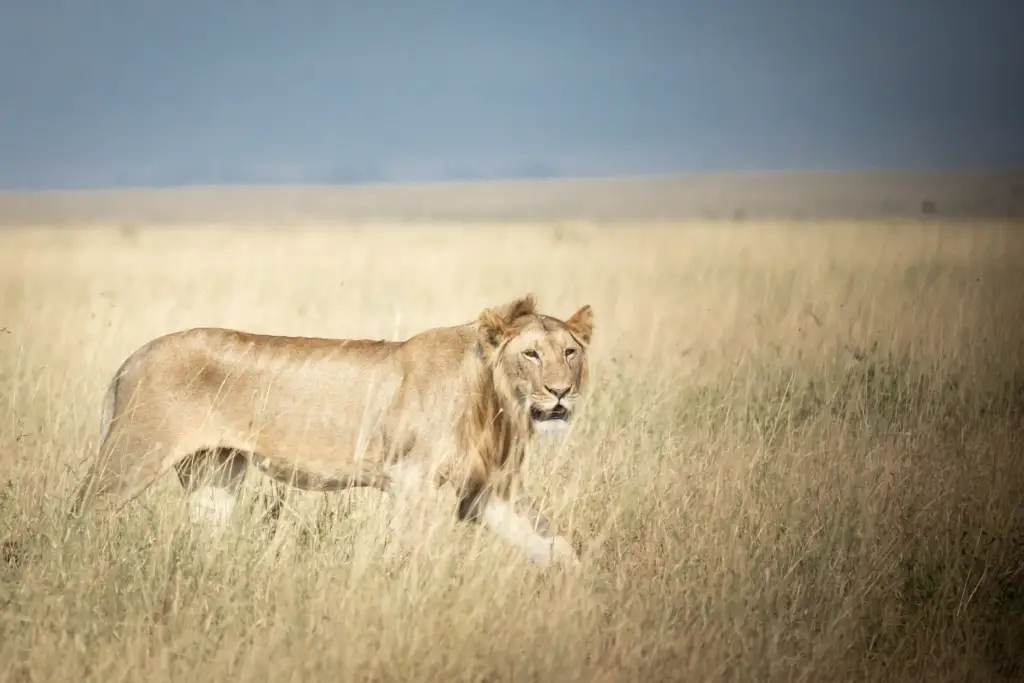Spotting a lion in the wild is a moment you’ll never forget—and in Tanzania, it happens more often than you’d think. Locally known as “Simba,” the lion in Swahili is not just a powerful predator but a cultural icon woven into the spirit of every safari adventure.
In Swahili, “Simba” means lion, one of the most powerful and respected animals in Africa. This simple word holds deep meaning in East African culture and language.
Swahili is spoken by millions of people across countries like Kenya, Tanzania, and Uganda. It is a language full of history, beauty, and connection to the land and its animals.
Lions are known for their strength and leadership, also play a big role in stories, traditions, and even daily speech. So when someone says “Simba,” then they are not just talking about a big cat, infact, they are talking about a symbol of pride and power.
In this article, we will explore how to say “lion” in Swahili and what the word “Simba” truly means. You will learn where the word comes from, how it is used, and why it matters.
It is a fun and easy way to understand a new language, and you will be surprised by how much you can learn from just one word.
What is the Swahili Word for Lion?
The Swahili word for lion is “Simba.” It is spelled S-I-M-B-A and sounds just like it looks: sim-bah. This word is used every day in Swahili-speaking countries like Kenya and Tanzania to talk about lions, which are common in African wildlife.
“Simba” is not just a word, as it is also a big part of the culture. Lions are seen as strong, brave, and royal animals, so the word carries a lot of respect.
In fact, it is mostly used as a name for boys or even sports teams to show power and leadership.
How do you say Female Lion in Swahili?
In Swahili, a female lion is called a “Simba jike.” The word “jike” means female, so when you put it together with “Simba” (lion), you get “Simba jike,” which simply means female lion.
This is how Swahili works for many animals. You add “jike” for a female and “dume” for a male. So if someone says “Simba jike,” then they are talking about a lioness. If they say “Simba dume,” then they mean a male lion.
It is a simple way to understand gender in the Swahili language. Just remember:
- Simba jike = female lion
- Simba dume = male lion
Meaning and Cultural Significance of ‘Simba’
In Swahili, “Simba” means lion, but it also stands for much more than just an animal. In many East African cultures, the lion is a symbol of strength, courage, and leadership.
That is why the word “Simba” is mostly used to represent power and pride, not just in the wild, but in people and communities too.
In places like Kenya, Tanzania, and Uganda, the lion holds a special place in stories, songs, and everyday life. The Maasai people, for example, have deep respect for lions and include them in traditional tales.
Some tribes even believe that facing a lion shows true bravery. Because of this, the word “Simba” is used to describe someone who is fearless or respected.
You will also see “Simba” used as a name for people, sports teams, and brands. It gives off a strong, confident feeling. Just like the lion is the “king of the jungle,” someone called “Simba” is seen as a leader or a fighter.
So, when you hear “Simba,” then you are not just hearing the word for lion, actually, you are hearing a word full of honor, pride, and cultural meaning.
Secret Names of Lions by Guides During Safari
On safaris in places like the Serengeti, guides mostly use code words when talking about lions over the radio. One clever word they use is “Sharubu,” which actually means “moustache” in Swahili.
Since male lions have thick manes that can look like a giant moustache, the word fits perfectly, and it helps to keep the conversation between guides more private and less obvious to tourists or nearby groups.
The plural form of the word is “Masharubu,” and it can also mean facial hair in general. So when a guide says “Sharubu?” on the radio, it is their smart and subtle way of asking, “Have you spotted a lion nearby?” Without saying the word “Simba” out loud, they can share updates or sightings without drawing too much attention.
It is a fun little secret of the safari world, and now that you know it, you will feel like an insider the next time you hear it. Just remember: “Sharubu” means you are getting close to one of nature’s most powerful animals.
FAQs
What is Mufasa in Swahili?
Mufasa is a name of African origin, often associated with royalty and leadership. It is believed to have roots in Swahili and is commonly used in the eastern regions of Africa. The name Mufasa comes from the verb “ku-fasa,” which means to “rule over” or “govern.”
What is nala in Swahili?
In Swahili, Nala translates to “beloved” or “gift”. It can also mean “queen”, “lion”, or “successful woman”.
What does Zazu mean?
Zazu is a name of African origin, meaning “protector”. It is also associated with the Swahili word for “movement”.
What is Zulu for lion?
In Zulu, the word for lion is “Ingonyama”. Other terms include “ibhubesi” and “imbube”.
What is a leopard called in Swahili?
In Swahili, a leopard is called “Chui”. The word “Duma” refers to a cheetah.
What is Zira in Swahili?
In Swahili, “Zira” translates to “refrain” or “to avoid”. It is used in proverbs and sayings to convey the idea of abstaining or keeping away.
What is pumba in Swahili?
The name Pumba comes from the Swahili verb “kupumbaa”, meaning “to be foolish”, “silly”, or “weak-minded”. It reflects the character’s carefree and humorous nature.




